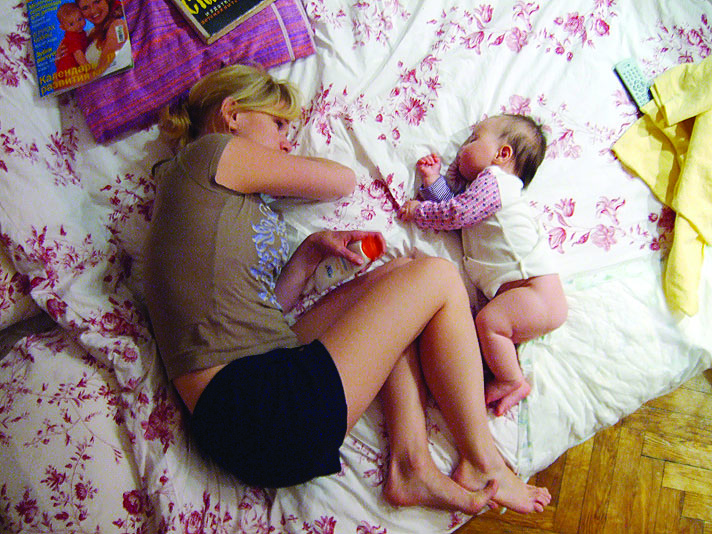College Student By Day, Parent All The Time
Those with kids struggle as they try to complete their education
Oleg Sidorenko / Creative Commons
Mothers don’t have any break time.
“I was 15 when I had my baby,” Diana Hernandez, a college student, said in an interview. “It really did send my life into a never-ending spiral of stress.” However, the moment she was able to hear his heartbeat. Diana said she “saw this as a huge blessing.”
When she told her parents, “they weren’t happy about it.” Hernandez recalled that “what hurt the most was my dad telling me that I had one week to pack my bags and leave.” Her aunt let her stay with her under the condition that she finds a job and continues school, while she looked after the baby.
The U.S. has gotten a lot better when it comes to family planning. Most people are waiting to have children and teenage pregnancy is down from earlier decades. A 2015 study conducted by the Centers for Disease Control and Prevention found that a total of 229,715 babies were born to women between the ages of 15 and 19. These statistics were compared to those from a 2014 study by the same group of scientists, which found that birth rates fell by 9 percent in 2015 for women between the ages 15 to 17, and about 7 percent for women ages 18 to 19.
When teenagers have a baby, people and society inevitably will look at them in a negative manner. But what if someone did get pregnant in high school or even their first few years of college? How can they fix their life and provide a better life to their child?
Diana is 17-years-old today. She got pregnant at 15. Her father, in particular, was very upset and discouraged, and felt like he had to provide for an additional mouth.
In many circumstances like Diana’s, a young woman would consider getting an abortion. Yet, like pregnancy rates, abortion rates are also relatively low.
“Government estimates indicate that teen abortion rates increased during the 1970s, stabilized during the 1980s at around 43 per 1,000 females ages 15 to 19, then decreased steadily to about 14 per 1,000 by 2011,” according to Child Trends, a research institution.
What about all the dads? What role do they play?
One college student explained that he knew his life had changed the minute he got his girlfriend pregnant. “It really wasn’t easy at first when it comes to raising a kid,” he told me, asking to be anonymous. “You get looked at weirdly at the mall, the supermarket, and at parks because, at my age, you’re supposed to be applying for scholarships, colleges and universities.” Instead, he noted, he is “applying for child daycare and signing WIC checkbooks.”
He is determined to change his life and attends community college. In the future, he may want to move to Oregon, a place where he thinks he can more easily afford the cost of living. He and his girlfriend plan to make the move together.
One of the biggest struggles was to find a stable job that didn’t interfere with his school schedule, and still allowed enough time to drop off and pick up his baby from daycare.
“I work 25 hours to 30 hours a week to be able to just buy my son’s baby formula, clothes, diapers and wipes. I do this for him because he completely changed my life around in a positive way, instead of a negative way like society would often times see it.”
He plans on completing his education and increasing hours worked. “I’m just lucky that my parents are supporting me, my girlfriend and my son, their grandson, pushing me to finish school, find a good job, and put me and my family forward,” he said.
Sadly, not all families are supportive. With minimal help from the families of both young parents, these two are often left with no choice but to drop out of school, in order to work and provide for their newborn. On top of that, they have to worry about ways in which they can pay other bills, and lead a healthy lifestyle with one another.
Among dropouts, according to statistics by the National Conference State Legislature, “only 40 percent of teenage mothers finish high school. Fewer than 2 percent finish college by age 30.”
“Teenage fathers, regardless of their marital status at conception or age at first birth, were much more likely to have been high school dropouts than were other male teenagers,” according to an article in the National Center for Biotechnology Information. “Teen dads are less likely to finish high school than their peers,” claimed a research on teenage fathers compiled by DoSomething.org. The race and the community that they live in, can also have an impact in whether or not a teenage male will complete school.
There are many teenage mothers and fathers who still defy the odds and become outstanding achievers, regardless of the amount of support that they receive. But don’t think it’s easy. Having a child so young, often makes one rethink priorities and put goals on hold.

